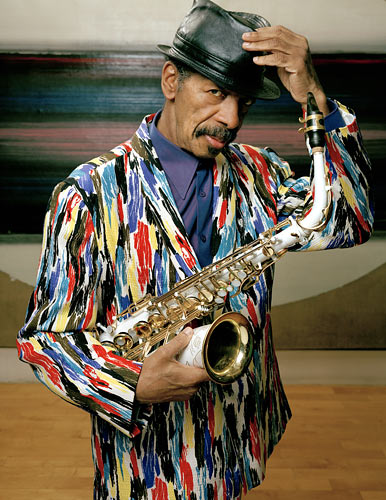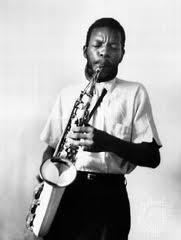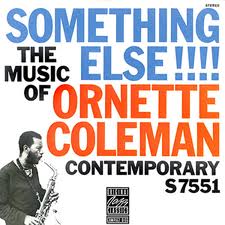Jazz enthusiast Adam Hyman contributes this appreciation of Ornette Coleman to arts·meme:
 Ornette Coleman, who returns to UCLA Live on November 3, is one of jazz’s few remaining legends to walk among us. He’s usually credited with creating “free jazz.” In fact, a variety of free-jazz experimentations preceded him. What Coleman created, as part of his truly artistic world view, was a new way of listening, and a new way for players to interact. He’s stuck to that view through thick and thin; it’s all he knows.
Ornette Coleman, who returns to UCLA Live on November 3, is one of jazz’s few remaining legends to walk among us. He’s usually credited with creating “free jazz.” In fact, a variety of free-jazz experimentations preceded him. What Coleman created, as part of his truly artistic world view, was a new way of listening, and a new way for players to interact. He’s stuck to that view through thick and thin; it’s all he knows.
Audiences laughed at Coleman when he was young, and they still walk out of his shows, confusing him with Sonny Rollins, or hoping for pretty music. Instead they encounter his keening notes, funky rhythms, and long sections of apparent chaos, which all the musicians play separately… or so it seems. But listen closely – Coleman isn’t about easy pleasures, although some of his superb melodies provide those as well. Listening to Coleman is about listening to the group, and the way it interacts.
Born in Fort Worth, TX, in 1930, Coleman moved to Los Angeles where he developed his sound through the 1950s. Even then, fellow travelers knew he was on to his own thing. The late Buddy Collette, who died just last month, in his oral history in Central Avenue Sounds, spoke of Coleman in the mid-1950s:
 “I heard he had gone to one teacher who said, ‘We’ll have to do something with your tone.’ And Ornette said, ‘No. I don’t want to sound like every other saxophone player. I’ve got my own thing.’ He knew where he was going all the time. When the group got together with Don Cherry and the others, the tunes were so strange at first, and even the intonation was weird. But they began to make some of us believe that they knew where they were going.”
“I heard he had gone to one teacher who said, ‘We’ll have to do something with your tone.’ And Ornette said, ‘No. I don’t want to sound like every other saxophone player. I’ve got my own thing.’ He knew where he was going all the time. When the group got together with Don Cherry and the others, the tunes were so strange at first, and even the intonation was weird. But they began to make some of us believe that they knew where they were going.”
Drawing from R&B, from bebop, and from his own notion of freedom, Coleman created a sound by the late 1950s that was demanding, vital, and controversial. His original L.A. band included Don Cherry, Charles Haden, and Billy Higgins. When the group moved to New York and released the seminal albums Something Else (Contemporary Records, 1958) and The Shape of Jazz To Come (Atlantic, 1959), jazz changed. Coleman freed the art form from conventions of harmony, melody, and rhythm, while preserving the highest possibilities of group improvisation. To many ears, it was nothing more than chaotic caterwauling, and when practiced by musicians unskilled at listening to one another, it could be. But with Coleman and his talented posse, it touched genius.
 Improvisational invention, by the individual and by the group, could go wherever the player’s emotion or intellect took it, not locked into preset chords (thus, “free” jazz). While one player improvised, the rhythm section could also improvise, or find new ways to harmonize. But the crucial skill is group listening, the preservation of the skill and desire of the musicians to make good music with one another. Not chaos, but new possibilities of order. And as the musicians listen closely to one another to make great music, the audience finds its rewards by listening closely to the band.
Improvisational invention, by the individual and by the group, could go wherever the player’s emotion or intellect took it, not locked into preset chords (thus, “free” jazz). While one player improvised, the rhythm section could also improvise, or find new ways to harmonize. But the crucial skill is group listening, the preservation of the skill and desire of the musicians to make good music with one another. Not chaos, but new possibilities of order. And as the musicians listen closely to one another to make great music, the audience finds its rewards by listening closely to the band.
Coleman’s music remains brilliant to this day, expanding possibilities in many recordings, reforming new combinations, but never kowtowing to public taste. The last time he played at Royce Hall in 2007, I saw droves of season ticket holders head for the doors, not up for the challenge and the rewards of Coleman’s freedom.
Ornette Coleman | UCLA Live | November 3
- There’s a fabulous documentary portrait of Ornette by filmmaker Shirley Clarke called Ornette: Made in America, following him in various performances and interviews, especially in a return to Fort Worth His open, humble is obvious throughout, as is his singular commitment to his art. Now available on DVD-R, but occasionally screened as well.
- Ornette’s site provides many links, video clips from concerts, and more.
- An account of Ornette’s residency at the Five Spot in New York in 1959
Adam Hyman is a documentary filmmaker and the executive director and programmer of Los Angeles Filmforum.

Hi,
Just oen quick update. The film Ornette: Made in America now has a great and legit DVD & Blu-Ray release from Milestone Films:
http://www.milestonefilms.com/products/ornette-made-in-america
Highly recommended.
We’ll miss Ornette,a nd our world is richer for having had him in it.
Ornette is the greatest. Don’t miss him, take your friends and everyone you know that likes jazz to this great concert….see him live, experience the best!